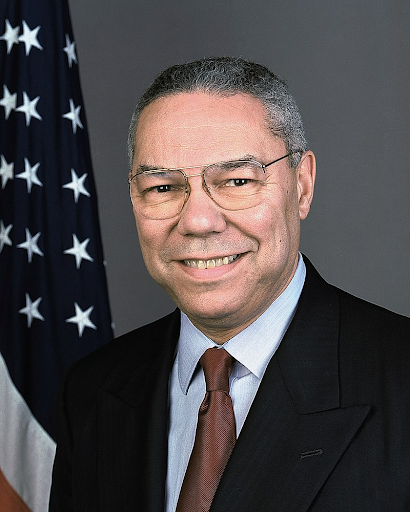Guy Cardwell
Staff Writer
On October 18, General Colin Powell died from complications of COVID-19. Powell was born on April 5, 1937 to Jamaican immigrants and grew up in the Harlem neighborhood of Manhattan, New York City. He studied geology at the City College of New York and described himself as a “C average student.” After attending the Reserves Officers Training Corps while in college, Powell started his career in the military, fighting in the Vietnam War and eventually becoming a four-star general. Powell served as Secretary of State from 2001 to 2005 and as Chairman of the Joint Chiefs of Staff from 1989 to 1993. Alexandria City High School Assistant Principal Christopher Thompson, Junior Reserve Officer Training Corps Program instructor Sergeant Felisa Holden, and JROTC instructor Sergeant Major William Jordan reflected on Powell’s life.
Thompson followed a similar trajectory. He is a Jamaican immigrant and enjoyed his experience in the military. “I worked with men of different backgrounds and from different locations. It was a great experience overall,” he said. Thompson worked in the Marine Corps, doing search and rescue during natural disasters.
In 1989, Powell was appointed as the Chairman of the Joint Chiefs of Staff, a military advisory body to the president. Powell oversaw U.S. involvement in conflicts such as the Persian Gulf War and the Invasion of Panama. He emphasized the importance of foreign support, clear objectives, and an exit strategy when engaging in military conflicts. Powell also saw war as a measure that should only be taken after all diplomatic routes have been exhausted. This was dubbed by journalists as the “Powell Doctrine.”
From 2001 to 2003, Powell worked as Secretary of State under President George W. Bush. Thompson described this as an important moment for African Americans., “He was the first African American to serve in such a highly respected role,” he said. While serving as Secretary of State, Powell was criticized when he gave faulty information to the United Nations on Iraq’s nuclear weapon capacity, which contributed to the U.S. decision to invade Iraq. Powell has described this event as a painful “blot” on his record. During his term, Powell led the nation’s HIV/AIDS initiative and is credited with improving U.S.-China relations.
Thompson said that Powell’s legacy lives on today, “He was highly intelligent, his work was highly respected in the military community, and he worked on a lot of different foreign policies that still make us have allies overseas. Although he’s not here with us, his work is still instrumental.”
Sergeant Holden was devastated by Powell’s death. “He made an impact on all areas of life. He was an icon.” She recalls taking a group of junior cadets to meet Powell in 2016. The students briefly spoke to Powell but were interrupted by a crowd of fans before they could take a picture. “Yes, we were disappointed, but we did get to speak to him. What an honor for us all,” she said.
Sergeant Holden views Powell as a role model for students. “The Honorable Colin Powell was a leader, not a follower. He started mopping floors… [and] he ended up being the first African American Secretary of State. It doesn’t matter where you start, it’s how you finish.”
Fellow JROTC Instructor Sergeant Major Jordan recalls assisting Powell as security during a welcome home celebration from Project Desert Storm. He had similar sentiments regarding Powell’s death, saying, “He was an inspiration to many young soldiers and was truly a hero to many.”






